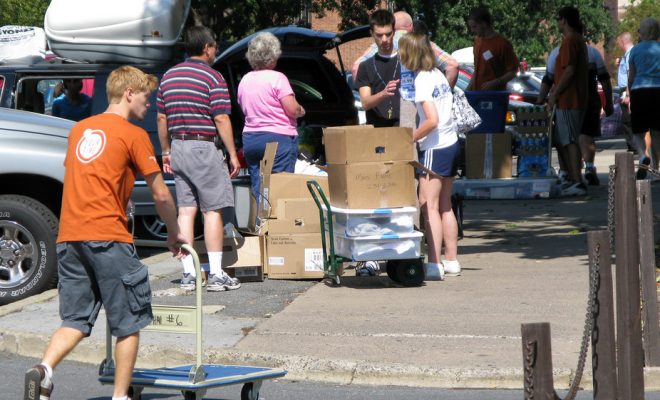Creating Comics as a Form of Community Service

A math and science teacher uses online comics to inspire her students to collaborate and connect with their community, whether they’re in the classroom or at home.
I understand you’ve asked your students to perform plays and engage in other social, almost narrative activities to explore science concepts. Could you please give me an example or two and explain what that looks like in practice?
In the past I’ve had students write scripts for plays and then perform them together. So, for a lesson on weather fronts, I might ask them to write a play about a day at the beach and how a particular weather front affected their plans.
This year we went over what a safe classroom looks like with COVID, with students responsible for creating a classroom in MinecraftEdu that followed these guidelines. Students took us on a tour of their classrooms and had to explain why they created things the way they did. I was looking for correct social distancing with desks and students, hand-washing stations, and face masks. Students had such great ideas that we took some of them and rearranged our classroom for better classroom flow.
I find assignments that allow students to show their understanding and allow them to bring in a little creativity give me a better understanding to showcase what they know. Students are taking what they learned and applying it to a real world problem. I feel students will also remember these assignments far better than any question I could ask them on a test.
How did you end up asking your students to create comics? How did that first lesson with comics go?
Everything was so different in the classroom because of COVID, and as our weather unit was approaching I realized that the weather front plays I had planned wouldn’t work. The rules were loosening in our district a bit at that point, but students still couldn’t share materials, and they were supposed to remain at least three feet apart.
I love doing projects, but I was having a hard time wrapping my head around fun ways to have them show what they’ve learned together. For some reason I started thinking about comics, and then I found this app, Pixton. My sister teaches in the same building and she had used it with her class, so I felt comfortable just jumping in. I was blown away by all you could do with it.
I have about 40 kids for 6th grade, and I started by having them create their avatars and then do the weather front project in comic form, instead of writing a script. I think my kids are pretty tech-savvy, but Pixton was so user-friendly for them, they mostly figured it out on their own.
It was the first project I’ve done where I’ve had complete engagement. Everyone turned their project in, and while they were working on them they were all talking about what they could do. I gave them four weather fronts to choose from and said they had to do two, but could do three or four for extra credit. So many of them did all four!
And the projects were hysterical. They presented them over a couple of days, and every time a kid got up there, the rest of the class was laughing along with them. I didn’t even realize that once I’d made a class in Pixton, they’d be able to bring their classmates’ avatars into their own comics, so they’d have their friends in panels asking questions, which got everyone involved in a really fun way. I even became a superhero in one and flew through a slide!
How do comics help you assess student learning? How does a comic project give you deeper insight into how well they’re understanding science concepts?
They were able to really show that they understood the concepts in a very natural way. For example, in one a student found a little kid who wanted to go to the beach, but there was a dangerous front coming in, so they had to explain to the child how the front would behave and why that would make the beach an unpleasant place to be.
The next places I plan to use it are for a couple math projects. In one, I’ll have them create a 3D object in Pixton and then show me or another character how to find the volume to cap that chapter in their math book. I’m also working on a rubric for the following chapter that will have them using comics to explain vocabulary related to rational and irrational numbers.
I think the magic of comics for assessment is in the storytelling. Students aren’t just spitting facts back at me by rote; they’re thinking about the ways these ideas relate to challenges people face or phenomena they encounter—or, at the very least, about how to explain them to someone who doesn’t understand them. Getting students to grasp the idea that I want them to show me what they’ve learned instead of just giving the right answers can be hard. When I ask them to do it in comics, they just do it because there’s no way around it if they want to make a fun comic—and they definitely want to have fun.
Why are these kinds of fun group projects important to student learning?
During social distancing, bringing social interaction into the classroom was so hard. Comics became one of the only appropriate means of engaging my students in work with each other. I still had some kids learning remotely, but they were able to work on comics from home with the app. If they were quarantined, I could still put them in a breakout room with a partner who was in class or at home, and they could contribute just as well as any of the students in the room with me. Just seeing them laughing and having fun was nice, to be honest with you, especially in such hard times.
I also feel like these projects are important for developing 21st-century skills like communication, collaboration, creativity, and critical thinking. Students need opportunities to learn these skills. Often they are expected to just know how to work collaboratively on a project. That’s hard! We need to build in these types of activities so we can show students how to work together, what to do when you disagree with your classmate, and how to make sure all members in a group are getting the opportunity to share their ideas.
Why is it important to tie science back into the larger community outside of school?
Community service has allowed students to help those in need. The opportunity to see a project through from beginning to end has had a tremendous impact on many of my students. In the past we have brainstormed ideas for community service, chosen one service idea, made posters, and talked to different members of the community to raise awareness, then possibly raised money if needed, and lastly visited the organization. I feel these types of projects leave a lasting impact on the students and adults involved. My past students (who are in high school now) still bring up a Rhode Island State Bill that we tried getting passed to ban the sale of ivory. Comics could have worked in this situation. Students could create a story of how poachers are killing elephants for their tusks. These comics could be printed or shared electronically to reach a greater audience.
Every year, our school has each grade level or classroom work on some kind of community service project. I’ve always run a veterinarians club, and we’ll donate to rescues or do work for them. Recently we had a student with brain cancer, so the school raised money for the Tomorrow Fund. A lot of my students don’t have access to a yard, so this year I’m going to do a community container garden to grow vegetables and talk about healthy food and nutrition. I already have trees and six packs of soil with zucchinis, tomatoes, and lettuce.
I’ve been thinking about having students create healthy eating comics to show that they understood my health lesson on nutrition. They would have to plan a menu including breakfast, lunch, dinners, and snacks. I think a comic would be a great way to showcase this learning.
If you were talking to a teacher who was interested in introducing comics to her science classroom, what advice would you have for her?
I think a lot of times teachers feel overwhelmed with all the tools out there, but if you can find a couple tools that work across grade levels and subjects, you can just focus on the creative aspects instead of what you’ll use to bring it to life.
I would just tell them to jump right in because it was so easy. As I said, the engagement was just awesome. I’ve printed their comics and they’re just so proud of them that I’m trying to fit as many as I can in the little showcase outside our classroom.
This turned out to be one of the best projects I’ve ever assigned in terms of getting them to show me what they know when I just jumped in. So join us! The water’s fun!
Nicole Guyon is a 6th-grade math and science teacher at Community Preparatory School in Providence, RI. She can be reached at [email protected].






